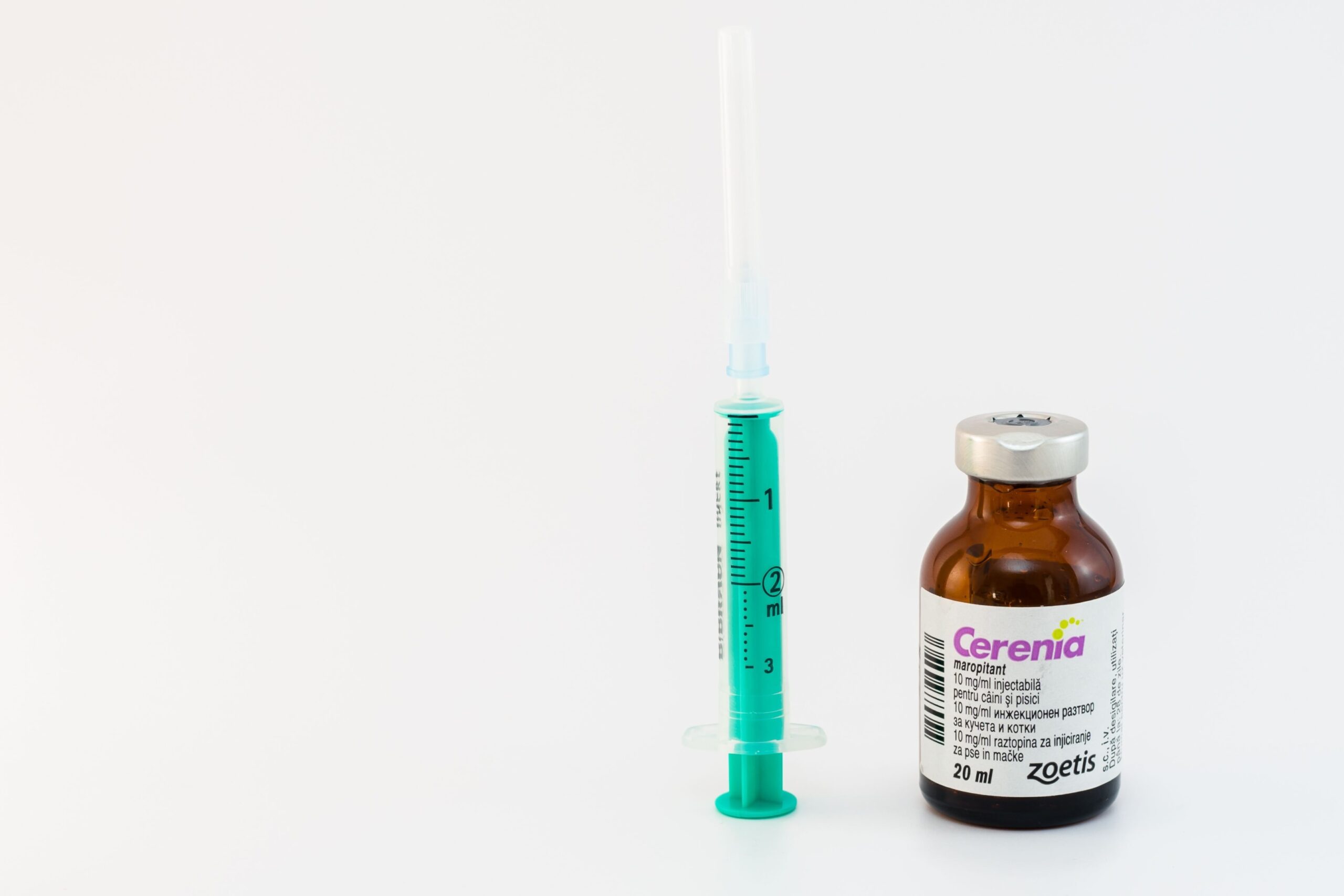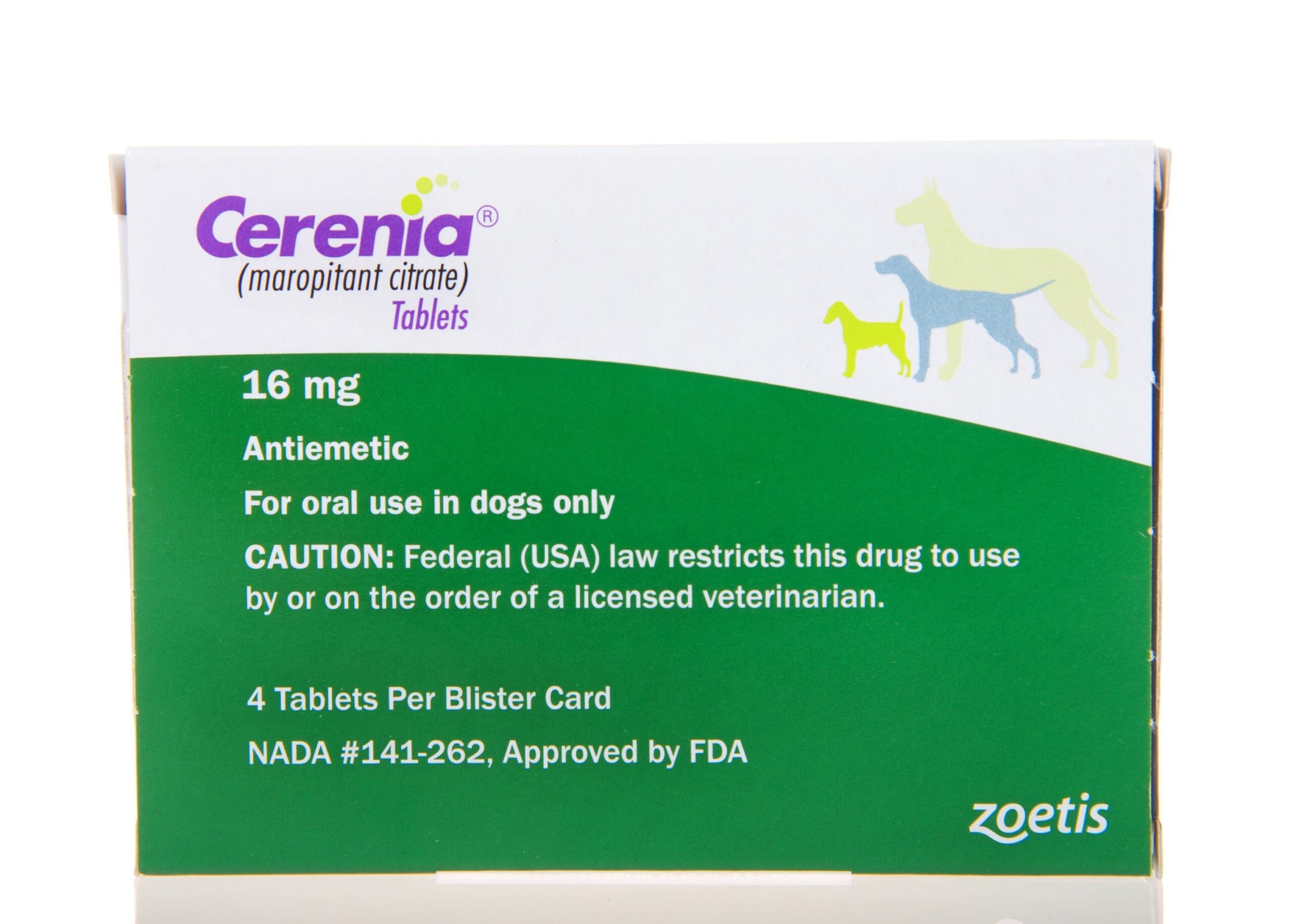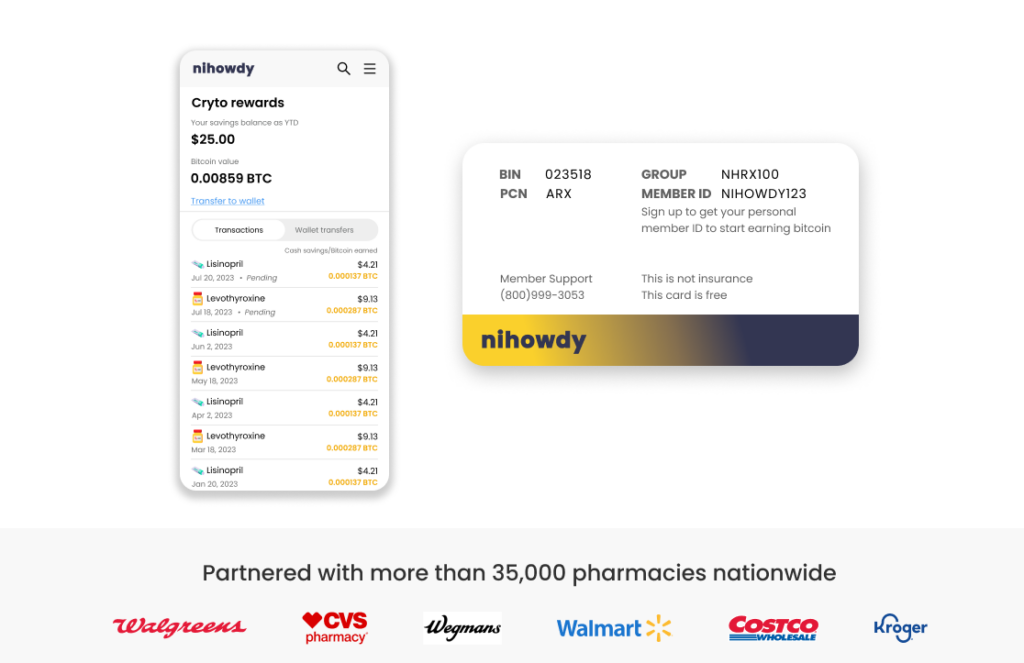Cerenia for Dogs: Comprehensive Guide to Relief from Nausea and Vomiting


Curious whether Cerenia is the appropriate treatment for your canine’s nausea or motion sickness? This drug, which has received FDA approval, specifically targets and helps prevent vomiting in dogs due to various causes. In this brief overview, you’ll learn about its applications, mechanism of action, and critical safety tips that will equip you with knowledge before discussing it with your vet.
Key Takeaways
Cerenia, with its active ingredient maropitant citrate, efficiently prevents vomiting in dogs by blocking the neurotransmitter substance P from the central nervous system.
Cerenia is versatile. It treats acute and chronic vomiting, including motion sickness in dogs, and comes in tablet and injectable forms tailored to different treatment needs.
While generally safe, Cerenia can have side effects and should be used cautiously in particular dogs, with veterinary guidance needed, especially during pregnancy, for nursing dogs, or those with liver or heart conditions.
Understanding Cerenia: An Overview

What is the function of Cerenia? Known generically as maropitant citrate, Cerenia is an FDA-approved drug for dogs that prevents explicit vomiting. How does it accomplish this task? By its distinct mechanism of action within the central nervous system, where it inhibits neurotransmitters like substance P from attaching to NK1 receptors—effectively stopping vomit reflexes without impacting the gastrointestinal tract directly. Quite intriguing.
This medication’s range extends beyond a single application. It’s effective for acute vomiting and addressing issues such as motion sickness in canines. The way Cerenia stops the chain reaction leading to vomiting within the central nervous system renders it an essential option for pet owners and vets working together to treat instances of canine emesis due to motion or other causes.
The Science Behind Cerenia
Delving into Cerenia’s scientific mechanisms reveals its efficacy is principally due to its active component, maropitant citrate. Maropitant citrate inhibits substance P within the central nervous system, crucial in prompting vomiting. As such, Cerenia adeptly mitigates multiple causes of nausea and vomiting at both central and peripheral levels, thereby offering dog owners a dependable solution.
Due to maropitant citrate’s substantial affinity for blood proteins, its anti-vomiting properties are amplified. This enhanced binding capacity enables it to counteract gastrointestinal-based emetic triggers and those unrelated to digestive issues—including motion sickness—providing versatile relief for your canine companion’s upset stomach or travel-induced discomfort.
Cerenia’s Role in Treating Vomiting in Dogs

You might wonder what conditions Cerenia can address. It’s heartening to know that Cerenia is highly effective in controlling vomiting stemming from central nervous system causes and peripheral factors. It is adept at treating gastroenteritis, pancreatitis, and infections within the intestines.
Beyond its utility for gastrointestinal problems, including inflammatory bowel disease, Cerenia extends its benefits to more complicated medical issues, such as liver disease. Nevertheless, caution must be exercised when using Cerenia for dogs suffering from gastrointestinal obstruction or after ingestion of toxins. In these scenarios, seeking immediate veterinary care is essential.
Acute Vomiting and How Cerenia Helps
If your dog is experiencing acute vomiting, Cerenia can offer swift relief. To prevent acute vomiting, it’s recommended to administer Cerenia at a starting dose of 2 mg/kg body weight daily for as many as five days in succession. This offers quick and considerable comfort for your furry friend grappling with gastrointestinal distress.
Nevertheless, interventions may be necessary if vomiting persists even after administering Cerenia. In situations where continuous vomiting occurs, dogs should undergo rehydration therapy to counter potential hypotension risks associated with maropitant use. Such measures are critical to maintaining your canine’s hydration and overall well-being while under the medication’s influence.
Addressing Chronic Conditions
Should your dog be afflicted with ongoing ailments such as kidney disease, don’t despair—Cerenia is here to assist. This drug is capable of alleviating the nausea and vomiting that often accompany chronic conditions. For persistent vomiting, a single dose of Cerenia can offer relief for up to 24 hours, granting extended comfort to your furry companion.
It’s essential to use Cerenia cautiously in dogs suffering from liver problems since its active component, maropitant, undergoes metabolism in the liver. Always seek advice from your veterinarian to confirm whether Cerenia constitutes an appropriate option for treating your canine friend’s condition.
Motion Sickness Solutions with Cerenia

Transitioning to a prevalent issue affecting numerous dogs – motion sickness. It may surprise you that almost half of the canine population, precisely 48%, grapple with this condition. If your furry companion falls into this category, knowing an effective remedy is reassuring: Cerenia boasts an impressive efficacy rate of 93% in staving off vomiting when administered prior to travel.
Unlike standard over-the-counter options such as Dramamine or Benadryl, Cerenia stands out for its FDA approval tailored explicitly for dog use. This circumvents usual side effects like lethargy, among others. Its tablet form enhances the ease and accuracy of administration.
Preparing for Travel: Cerenia Dosage Guidelines
To avoid motion sickness in your dog while traveling, it is crucial to administer Cerenia tablets correctly. Remember that these tablets should not be used for dogs under four months old. You can proceed with the medication if your canine companion exceeds this age threshold.
Administering Cerenia to your dog two hours before travel will optimize its effectiveness and help prevent motion sickness during transit. For maximum efficacy, adhere strictly to the dosage and guidelines prescribed by your vet.
Administering Cerenia: Injection vs. Tablet

It’s well-known that Cerenia is offered in tablet form. There’s also an injectable version of Cerenia available. Indeed, you can find Cerenia as both a liquid injection and in oral tablets. The injection is usually reserved for quick results, often utilized around the time of surgical procedures, whereas tablets are more commonly used for extended treatment plans.
When giving your dog Cerenia at home to prevent motion sickness before a journey, it typically involves oral tablet administration. For optimal effectiveness against motion sickness, these tablets should be given about two hours before travel time. It’s imperative to adhere strictly to the dosage and instructions provided by your vet whenever using any form of Cerenia with your pet.
Injectable Cerenia: When and Why?
Cerenia injectable solution is frequently utilized before surgical interventions to prevent nausea and manage pain. It proves particularly beneficial for surgeries addressing intestinal obstructions. Injectable Cerenia has been shown to lessen the chances of vomiting when used alongside opioids as a prosthetic, which can also lead to decreased requirements for anesthetics due to its visceral pain-blocking properties.
Cerenia injectables are critical during urgent medical treatments by offering prompt relief for veterinary patients. Apart from its applications in surgery, the use of injectable Cerenia extends to other ailments. It may help reduce coughing episodes in dogs afflicted with collapsing trachea conditions.
Oral Tablets: Long-Term Management
Alternatively, Cerenia tablets offer a practical solution for those caring for dogs with persistent nausea or vomiting. These oval-shaped, peach-colored oral tablets come in multiple strengths to suit the needs of different-sized dogs. The administration frequency is usually once a day, and dosages are carefully adjusted according to your dog’s body weight, thereby simplifying the long-term management of their condition.
For optimal absorption, it’s recommended that Cerenia be administered at least an hour before feeding your dog a substantial meal. This timing improves how well the medication can work within the body, ensuring that your canine companion receives effective relief from their symptoms.
Recognizing and Managing Side Effects
Cerenia, like other drugs, can cause adverse reactions. Typical side effects may include gastrointestinal upset, heightened saliva production, and infrequent skin allergies. These symptoms subside on their own within a day without needing medical intervention. If these signs linger beyond that period, your veterinarian may consider altering the dosage or ceasing the medication.
Other less frequent side effects that might occur in dogs when taking this drug are:
A reduction in hunger
Loose stools
Lack of coordination
Excessive salivation
Emetic behavior or gagging
Shaking or muscle tremors
Diminished activity levels or drowsiness
Should any of these rare side effects manifest in your dog after administering Cerenia, it’s critical to get advice from your vet promptly.
Allergic Reactions and Skin Sensitization
Localized allergic skin reactions and the risk of skin sensitization may occur with topical exposure to Cerenia. Repeated or prolonged exposure can exacerbate the likelihood of developing an allergic reaction.
Should accidental contact with Cerenia occur, it is advised to wash hands immediately. This measure helps address inadvertent exposure and lessens the possibility of a skin reaction. It remains important to exercise caution and adhere strictly to prescribed safety measures at all times when dealing with Cerenia.
Gastrointestinal and CNS Responses
After administering Cerenia, some dogs might suffer from effects impacting their digestive or central nervous systems. Signs such as trembling or a loss of balance warrant immediate consultation with a veterinarian. There is also the possibility of temporary low blood pressure following the intravenous administration of Cerenia injections in canines.
Monitoring your pet closely once they have been given Cerenia is crucial. Should you observe any atypical symptoms, promptly contacting your veterinarian should be your priority. Your pet’s well-being and comfort are paramount concerns, after all.
Special Considerations for Cerenia Use
When administering Cerenia, it’s important to consider several key factors. Nursing dogs and those with existing heart or liver disease should be given Cerenia with care. The effects of Cerenia on nursing puppies, breeding canines, pregnant bitches, and those that are lactating have not been thoroughly studied. It is advisable to refrain from using this medication in such cases.
In addition to these precautions, special attention should be paid when giving Cerenia injections to dogs suffering from heart conditions due to the potential for inducing arrhythmias. Before introducing any new drug regimen for your pet companion’s treatment plan, including but not limited to Cerenia administration, professional veterinary advice must always be sought.

Age and Health Status
Recognizing that Cerenia has been sanctioned for use in dogs 16 weeks of age or older is essential. The prescribed dosage of this medication differs based on its purpose, whether it’s to prevent acute vomiting or to provide relief from motion sickness.
For any pet owner who takes the well-being of their animal companion seriously, confirming your dog’s eligibility by age and health condition before administering Cerenia is critical. It is always advisable to speak with a veterinarian to confirm that utilizing Cerenia aligns with the best interests of your canine friend’s health needs.
Interactions with Other Medications
When prescribing Cerenia, it’s critical to take into account possible drug interactions. Ensure you discuss all medications that are currently being taken with a licensed veterinarian. Notably, Cerenia may have interactions with the following drugs:
Non-steroidal anti-inflammatory drugs (NSAIDs)
Phenobarbital
Chloramphenicol
Ketoconazole
Thyroid hormone supplements
When using Cerenia in conjunction with drugs that bind heavily to proteins, exercise extra caution due to potential competitive binding and resulting inhibition of metabolism. The exact nature of interactions between maropitant, the active ingredient in Cerenia, and other antiemetic medicines hasn’t been fully established. Hence, ongoing vigilance and regular consultation with your vet is paramount.
Maximizing Benefits with NiHowdy’s Prescription Discount Card
After familiarizing yourself with Cerenia’s uses, it’s important to consider ways to reduce expenses on your animal companion’s prescriptions. NiHowdy presents a top-tier prescription discount card that delivers considerable savings for medications, including those like Cerenia, which can help lessen financial stress.
NiHowdy’s prescription discount card comes packed with additional perks.
A pioneering reward program that bestows Bitcoin upon customers for their transactions
Immediate price reductions at participating pharmacies
The potential to accrue as much as 3% back in Bitcoin rewards each time you refill a prescription — an advantage whose worth could amplify as time passes.
How NiHowdy Enhances Your Pet Care Budget
NiHowdy’s prescription discount card can greatly improve your pet care budget. By using NiHowdy, you can receive up to an extra 3% back in Bitcoin on each prescription purchase. This potential for increased value as time goes by presents opportunities for long-term savings.
By providing reduced prices on prescription medications, NiHowdy eases the current financial strain experienced in managing pet care budgets. Utilizing NiHowdy’s prescription discount card may help counterbalance the increasing costs associated with pet healthcare and can also assist in covering other significant expenses over time.
Summary
We’ve covered a lot of ground in this blog post, haven’t we? From understanding Cerenia and its applications in treating various conditions to recognizing potential side effects, you’re now well-equipped to care for your pet’s health in a more informed way. And let’s not forget, with NiHowdy’s prescription discount card, you can now manage your pet’s medication costs effectively while earning Bitcoin rewards.
As we wrap up, remember that while Cerenia is a versatile and effective medication, it’s crucial to consult your vet before starting any new medication for your pet. After all, every dog is unique and deserves personalized care. Here’s to happier, healthier pets!
Frequently Asked Questions
What is Cerenia and how does it work?
Cerenia, the brand name for maropitant citrate, has been FDA-approved as a medication for dogs that hinders vomiting. It achieves this by obstructing neurotransmitters from binding to particular receptors within the central nervous system.
What conditions can Cerenia treat?
Cerenia can address a variety of conditions, including gastrointestinal issues, motion sickness in dogs, and liver disease. It has proven effective for these diverse ailments.
Are there any side effects of Cerenia?
Indeed, frequently encountered adverse reactions to Cerenia include stomach discomfort, heightened salivation, and sporadic allergic reactions on the skin. Rarer side effects entail diminished hunger, diarrhea, lack of coordination, profuse drooling as well as instances of vomiting or dry heaving coupled with shaking or muscle tremors. It’s important to observe these symptoms and consult a veterinarian should they present themselves.
What are some special considerations for using Cerenia?
If your dog is currently nursing, pregnant, or suffers from heart or liver disease, exercise caution when administering Cerenia.
Before introducing any new medication to your pet’s routine, it’s imperative to seek the guidance of a veterinarian.
How can I save on my pet’s medication costs?
You can achieve substantial savings on their prescriptions by utilizing the prescription discount card from NiHowdy for your pet’s medication. With each refill of a prescription, there is an opportunity to earn as much as 3% back in Bitcoin rewards.


